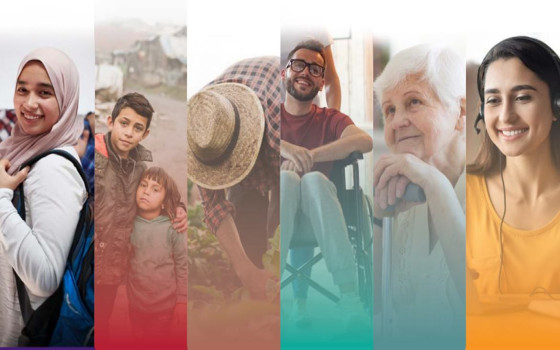
Towards a More Just World: UN Summit in Doha to Revive the Social Pact in a World Increasingly Marked by Digital Divides, Demographic Shifts, and Climate Disruptions

- Europe and Arabs
- Thursday , 30 October 2025 9:39 AM GMT
Doha – New York: Europe and the Arabs
What does it mean to build a society where everyone feels a genuine sense of belonging? In a world increasingly characterized by digital divides, demographic shifts, and climate disruptions, the promise of “social development for all” is becoming increasingly urgent, even if it seems elusive.
The idea of human-centered, inclusive, and equitable development is not new. It is a vision the world embraced 30 years ago at the United Nations summit in Copenhagen, and its echoes continue to resonate today. According to the UN Daily News, “Next week, leaders from around the world will gather in Doha, Qatar, for a high-level UN conference aimed at revitalizing that vision. From November 4 to 6, the Second World Summit for Social Development will bring together heads of state, ministers, civil society representatives, and experts to assess progress, address persistent gaps, and chart a new course forward. At the heart of the meetings lies a simple yet powerful question: How can we ensure that no one is left behind?” UN Under-Secretary-General for Economic and Social Affairs Lee Junhwa said the summit comes at a critical juncture. He added, “Inequalities are widening, trust is eroding, and societies are struggling with conflict, climate shocks, and rapid technological change. Yet, we are also witnessing extraordinary innovation, resilience, and solidarity.” This is our opportunity to rebuild trust between governments and their people, and between countries as well.” A Global Call to Action
Björg Sandekier, UN Assistant Secretary-General for Economic and Social Affairs, sees the summit as a “global call to action” at a time when more than one billion people still live in extreme poverty and 40% of the world’s population lacks social protection.
In an interview with UN News, she added that the meeting aims to renew confidence in collective progress – “confidence in our ability to make a difference.” This gathering follows months of intergovernmental negotiations in New York, culminating in the agreement on the Doha Political Declaration, which is expected to be formally adopted at the summit’s opening session.
Ambassador Alya Ahmed Saif Al Thani, Permanent Representative of the State of Qatar to the United Nations, said that the Doha Declaration is the heart of the summit. She added: “It is a global call to action, renewing governments’ commitment to creating an enabling economic, political, social, cultural, and legal environment for achieving social development for all.” A Pivotal Moment
The world has only five years before the deadline for achieving the Sustainable Development Goals by 2030, yet it faces significant delays on many fronts. On the front lines, progress in poverty reduction has slowed, gender equality has faltered, and many young people face a precarious future.
Ms. Sandhiar said that when UN Member States convened this summit last year, they sent a clear message that social development must once again take center stage.
Ultimately, it is about renewing our commitment to the core of the 2030 Agenda and ensuring that no one is left behind.
Participation and Foresight
Alongside the formal plenary sessions, a parallel program will add a participatory and forward-looking dimension to the summit. The Civil Society Forum, the Private Sector Forum, and the Interactive Solutions Arena will highlight innovations in employment, social protection, and building community resilience.
Youth and academic networks will take center stage, embodying the spirit of shared creativity and responsibility.
The new Doha Platform for Social Development Solutions—launched by host country Qatar in partnership with France—will highlight new commitments and initiatives, from policy reforms to partnerships, that address poverty, employment, and inclusion.
Ambassador Alya Ahmed Saif Al Thani said: “Doha once again stands as a symbol of global solidarity, where commitments inspire action and partnerships, and drive progress and a shared vision for an inclusive, sustainable, and peaceful future for all.”
Back to the Beginning
For Ms. Sandkir, who attended the first World Summit in Copenhagen in 1995 as a young activist, Doha represents both continuity and change. She recalled that at the time, there was great optimism and faith that multilateralism and cooperation would continue to advance.
She said: “Young people today face even greater challenges—from misinformation and climate anxiety to a lack of trust. But my message to them is simple: your participation matters.” “Raise your voices, forge partnerships, and push for action.” From words to deeds
The UN official in the Department of Economic and Social Affairs stressed that the summit’s success will not be measured by speeches, but by implementation. With a strong declaration and partnerships already in place, Sandkir said, “The real test is translating commitments into real improvements in people’s lives—decent jobs, social protection, and inclusion. That’s how we’ll know we’ve succeeded.” As world leaders gather in Doha, expectations and a sense of urgency are rising. Thirty years after Copenhagen, the task remains the same: to build a world where progress is measured not only by wealth, but also by well-being, equality, and human dignity.












No Comments Found